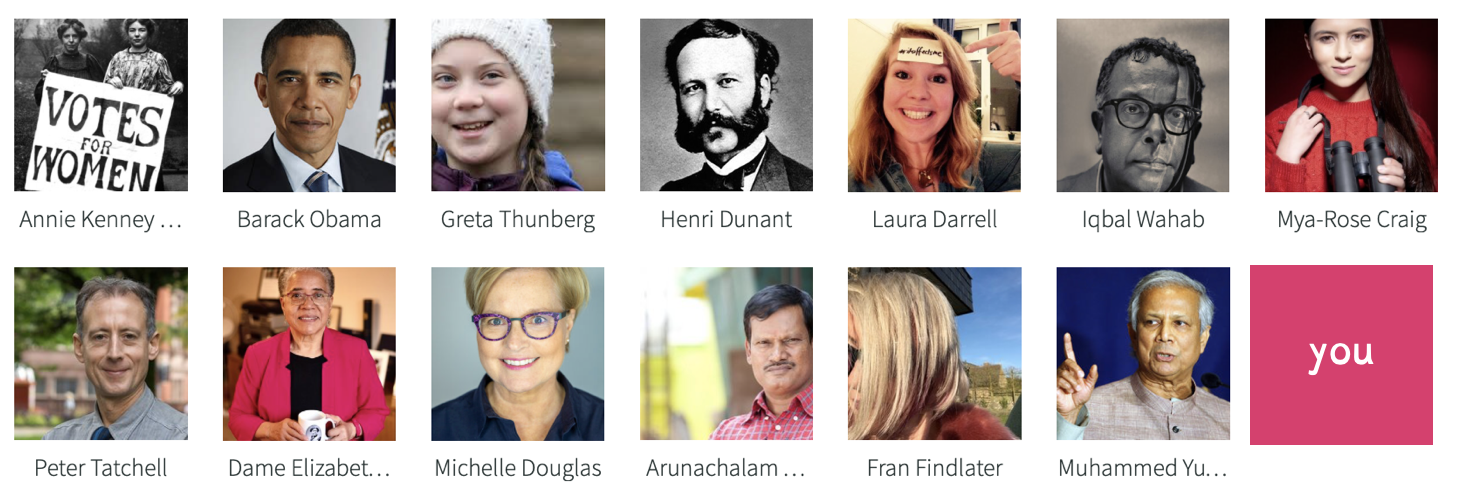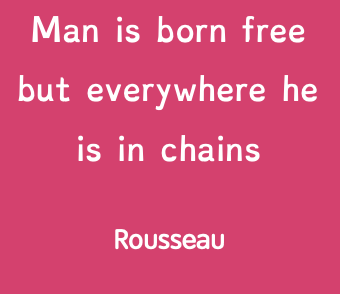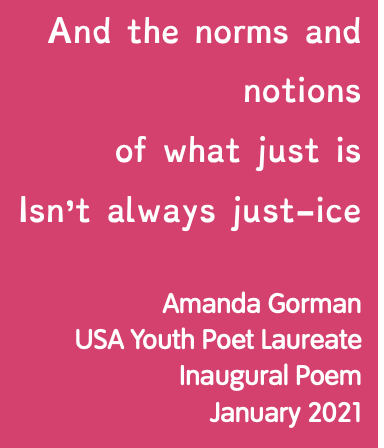Where’s the justice in that?
At Useful and Kind we are constantly trying to understand and to seek justice. Injustice fuels our collective desire to make things better for as many as we can. Rather like Bentham’s Utilitarianism of creating the best for the most we are impatient to create fairness, we are attracted to those for whom injustice is their lived experience. We exist because of Barack Obama’s invocation to us all to be Useful and Kind as a way of being and acting in the world.
But sometimes we wonder where to start when there is such endemic and systemic injustice and unfairness. History has favoured the powerful who have written their own laudatory histories; they have owned the means of transmission, from Caxton to Zuckerberg.
Our sense of individual justice comes early. At 6-10 months we are able to determine who is the victim and who the bully, and favour the former - so we could be epigenetically predisposed to this or it could be an extension of our primal sense of fairness about getting our needs met (1). The same pleasure regions of the brain are activated ‘as when we eat craved food, win money or see a beautiful face.’ (2) We learn it from primary caregivers, from groups, from our culture. We experience the benefits of shared justice - the old in-group hunting shared the spoils so that we all got fed.
But, and there are many buts, we have to add in power, greed, dominance and self-preservation. Those who could use their muscles and cunning to save a little extra for themselves for later were harshly dealt with.
Another but, is that the idea and practice of fairness and justice is predicated on equality.
We are not on a level playing field (3). Some people used that ‘muscle’ to take what wasn’t theirs but ours: people, land, nation, property and we moved away from an ancient, shared and some would say sacred view that we are but temporary guardians of the earth, the sea, our children, to one of personal ownership and wealth. Therein lies a profound shift in the social contract, the fault line of inequality and unfairness. We are not starting from a fair place. Fickle fate deals us a hand and even with the greatest mindfulness and compassion, how can we condone or healthily live in such an unjust system, that favours the few, where, as a young cleric said when considering the centrality of the confession in the liturgy, ‘most of us are actually more sinned against than sinning’.
There is no absolute binary in what is right and wrong, and good and bad. The phrase ‘all men are born equal’ has a rich genesis from Milton and Rousseau to Franklin and the abolitionists. And yet the very phrase contains an injustice against 51% of the population: women.
How can we be more nuanced and person and culture centred in our notions of criminal and social justice? In theory how can it be fair or just to imprison for years the mother who steals to feed her family when the boss of the firm she works for on minimum wage avoids tax? How is it just that you are 40, yes forty, times more likely to be stopped in London if you are a young black male?
Many contemporary economists (5,6,7) have written about the profound problems caused by both inequity and the notion of economic growth on a finite planet.
Justice has in its sinews the basic principle of respect. The wonderful idea of Thomas Harris (8) in his bestselling ‘I’m Ok, You are Ok’ is underpinned by notions of fairness, justice and equality. It builds on Carl Rogers’s (9) humanistic observations that we are all trying to be fully who we can be, given our circumstances - self actualisation. So too, are others, given theirs.
So how do we notice myriad injustices, how do we respond proportionately and appropriately? Catriona Stewart, head teacher of the first pilot school for the Useful and Kind Schools’ Mark said that the idea of being Useful and Kind had ‘been a simple way of communicating with children that they understand easily. Rather than lengthy discussions when they’re in bother with denials, counter claims and tears, just asking ‘were you being useful and kind at playtime?’ seems to elicit a greater self awareness and honesty than trying to investigate lengthy specifics’. And, interestingly, asking them what would be a Useful and Kind way of learning from their problem, is grounded in notions of restorative justice.
How can we notice and challenge personal and systemic injustice? How do we acknowledge the injustices that we personally benefit from? How do we counter them?
There are still many who do adopt a binary view, especially of criminal justice. I mistakenly googled ‘where’s the justice in that?’ and was bombarded by folk who felt the punishment too lenient. When you understand and appreciate the complexities of justice and the perpetrator’s background how does this help or hinder you in your sense of a helpful way forward when you feel personally aggrieved, ‘robbed’, wounded? It is important to understand the terrain of the offender: the mental health issues, the levels of literacy, the fact that so many are indeed sinned against. There has been inspirational work done whether the Peace and Reconciliation work in South Africa or the inspirational work of Marina Cantacuzino at the Forgiveness Project.
How then do we, with our microscopic agency, live in a just way, fight injustice, respect ourselves and others accepting that we can only make a small difference, without that inhibiting what we can do? Ben Phillips in his passionate paean to collobaration, How to Fight Inequality, (11) invokes us to join with others, to listen to them, to find common ground and to work together for a better fairer world.
Persuading others to change is hard. It is easier to find and blame perpetrators. Oxfam’s annual Davos figures (12) make it easy to single out the billionaires. But if there is to be change we need a more nuanced rich psychological understanding of how hard it is for some to sacrifice the false defence they hang on to, that riches offer against insecurity without first casting the beam out of our own eye. It is not one or the other but both.
Whilst the moral arc does bend towards justice in some cases we need a more powerful magnet to attract it. And in others time is not on our side. The crime of environmental injustice is here, right now, how does this change our attitude and action? Do we ignore it on the grounds of proximity, the impacts aren’t close to my backyard? Do we change our lifestyle? Do we lobby? Do we fight? Do we collaborate? What can we do today. Now?
Living a just life. Helping others. Being prosocial in a profoundly challenging world. That is our journey to justice. Let us help each other to be Useful and Kind.
Let us use the Useful and Kind SOW (Self, Others, World) model to explore our own current terrain around Justice.
Self
how are we just in our personal relationships?
how could we be more forgiving?
how can we develop the idea of guardianship and stewardship over ownership for ourselves?
how are we benefited from injustice and privilege (by class, race, sexuality, the point we find ourselves in history etc)?
what is within our agency to change?
how might our actions perpetuate injustice?
how can we recognise it, change it and fight against injustice?
Others
how are we just to others? Is it different if they are friends, family, group, team?
how do we respond to those who are unjust? do we try to understand the terrain that led to this?
do we model a different way?
is that sufficient?
do we campaign for change, do we offer carrot or stick or both?
how can showing understanding and love to the difficult others make a difference
World
what can we do to model, create and fight for a more just world?
what practical steps can you take today, next week, next month, next year?
how can you engage with what you cannot see?
what can you sacrifice for others, for the world, what can you go without?
how can you support yourself as you make these changes?
what prosocial action can you take - campaigning, demonstrating, modelling a new way?
Duncan Fraser
Resources / Bibliography
1) https://www.nature.com/articles/s41562-016-0037 Preverbal infants affirm third-party interventions that protect victims from aggressor. Yasuhiro Kanakogi, Yasuyuki Inoue, Goh Matsuda, David Butler, Kazuo Hiraki & Masako Myowa-Yamakoshi Nature Human Behaviour, volume 1, Article number: 0037 (2017)
2) https://web.archive.org/web/20100226000010/http://newsroom.ucla.edu/portal/ucla/brain-reacts-to-fairness-as-it-49042.aspx?link_page_rss=49042 Tabibnia, a postdoctoral scholar at the Semel Institute for Neuroscience and Human Behavior at UCLA and lead author of the study, which appears in the April issue of the journal Psychological Science.
3) https://www.youtube.com/watch?v=4K5fbQ1-zps
4) https://www.theguardian.com/law/2019/may/04/stop-and-search-new-row-racial-bias
5) Doughnut Economics, Kate Raworth, Random, 2018
6) The Economics of Arrival, Katherine Trebeck and Jeremy Williams, Policy Press, 2019
7) Plunder of the Commons, Guy Standing, Pelican, 2019)
8) Thomas Harris, I’m OK, You’re OK, Arrow (orig. 1967)
9) Carl Rogers, On Becoming a Person, Constable
10) Marina Cantacuzino The Forgiveness Project, Jessica Kingsley 2015, https://www.theforgivenessproject.com
11) How to Fight Inequality, Ben Phillips, Polity, 2020
12) https://www.oxfam.org/en/tags/davos




